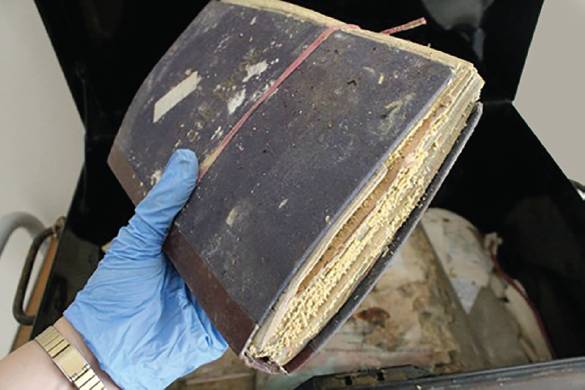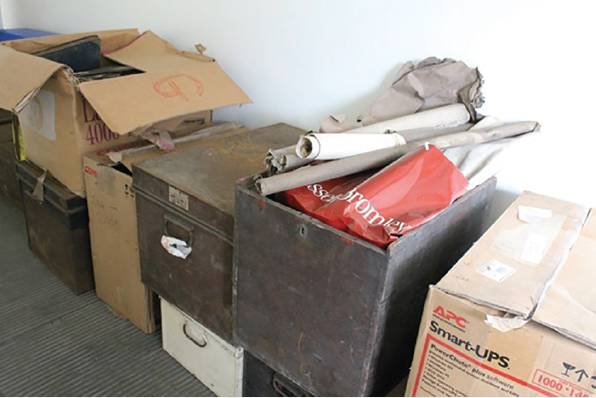Comment
Rescuing private sector legal records: what might be done?
The Legal Records at Risk (LRAR) project was set up to investigate the findings of past studies that the records of many specialised law institutions are at risk.1
About the author
Clare Cowling is an Associate Research Fellow of the Institute of Advanced Legal Studies and LRAR’s project manager.
Private sector legal records are at risk of becoming lost or inaccessible through globalisation, digital obsolescence, physical neglect, lack of interest on the part of information owners or reduced archive resources to preserve and provide access to the records. All records in the private sector face similar challenges, but modern legal records (from the early 20th century to the present day) are particularly vulnerable. Why is this?
Developments in the way legal services have been implemented, including the creation of the profession of Chartered Legal Executives, represent a sea change but, as yet, no systematic efforts have been made to preserve the history of this change through a systematic process to identify, preserve and make accessible, over time, the records which will document the provision of modern legal services.
Historical research has, hitherto, been weighted towards the government sector, the courts and legislation while the very real and important contributions made by the private legal sector have been largely overlooked. The LRAR project seeks to give a voice to the history of the private legal sector. It hopes to achieve this aim by locating and, where necessary, rescuing the business records of institutions specialised to law by finding suitable archive repositories to manage and catalogue them so that, eventually, they will be made available for research.

Records of historical value (in other words, archives) are important because they provide evidence of activities and tell us more about individuals and institutions. They also increase our sense of identity and understanding of cultures. They can even ensure justice (as evidenced by the recent Hillsborough inquest findings). Records were not usually created for the purpose of historical research, so they often provide a less biased account of events than secondary sources.
Private sector legal records, in particular, have a much wider significance than just for students of law. The legal practitioner’s role, as an integral part of UK business, cultural and social development, needs to be understood; therefore, it must be studied and evaluated. Without relevant records, this will be an uphill task.
Most private sector legal records comprise the business records of legal entities, such as law firms, Chartered Legal Executives, licensed conveyancers, arbitral organisations, barristers’ chambers, and membership or regulatory bodies. There is no national archive legislation in the UK requiring their historical business records to be retained permanently (with the exception of those records which are designated as public records under the Public Records Act 1958, for example, those of the National Coal Board). Within many organisations, therefore, little consideration is given to whether their records are, or will be, historically important; these records are, therefore, at risk.
Private sector legal records … have a much wider significance than just for students of law. The legal practitioner’s role … needs to be understood … it must be studied and evaluated. Without relevant records, this will be an uphill task.
Cost benefit Storing records in both paper and digital formats, including managing their security and continued accessibility, is costly. Disposing of those records no longer needed, including transferring those of potential historical value to an archive where they will be cared for by professionals, removes this burden.
Reputational benefit The legal profession is viewed by outsiders as unnecessarily secretive and arcane. Showing a willingness to make records available for research - once all confidentiality issues have expired - indicates that the profession is amenable to greater transparency and openness about the way it works, that it can demonstrate how lawyers have improved services to clients over time and that it cares about community engagement.2
Filling the historical gap Few private sector legal entities in the UK currently make their records available for research, which means that we have a court- and government-centric historical perspective of legal developments. Yet modern private legal sector business records are a potentially valuable field for scholarly research, which would counterbalance the prevailing legal research emphasis on the study of medieval and early modern court records, and provide a fruitful source for non-legal research (for example, social, geographic, biographic, race, gender, etc). LRAR seeks to bridge this research gap by brokering agreements between legal entities and archive repositories to deposit records and, when appropriate, make them accessible.

In the 12 months since the project commenced, we have done the following:
- Developed partnerships with the British Records Association and the National Archives to create a national strategy to save private sector records at risk, including legal records.
- Reached an agreement with a select number of archives to accept legal records of value, particularly the business records of legal entities where they are relevant to their collections’ policy.
- Undertaken case studies of the following: modern arbitration records in the Transport for London Corporate Archives (to determine the extent of such records in a business archives); the business records of a legal publisher and of the Council for Licensed Conveyancers (with the aim of finding a suitable external archival repository for their records); and of a prominent Northern local law firm with an in-house archive (to understand the business benefits of maintaining an in-house repository).
- Contacted 42 private sector institutions specialised to law to seek their participation and potential deposit of records in archives.
This last activity has met with minimal response despite repeated attempts, so we are seeking champions to support LRAR and lobby institutions specialised to law so as to persuade them that there are real business and reputational benefits to participating in the project. We hope that those champions will include CILEx and its members.
Do contact us if you believe that you or your legal agency holds records of potential historical value, if you feel that you can provide active support for LRAR or if you simply wish to find out more about the project.3
- To broaden the concept of ‘legal’ records from the traditional definition of them as court records or formal documents such as deeds to records of institutions specialised to law, including business records, mainly in the private sector. Our definition is wide and includes records of all the main types of providers of legal services (including law firms, Chartered Legal Executives, patent agents, licensed conveyancers and court interpreters) arbitration records and the records of ancillary bodies, such as legal stationers and law publishers.
- To identify legal records of potential research value.
- To identify legal records of potential value which may be at risk through neglect, digital obsolescence, lack of interest or lack of resources to preserve and provide access to the records.
- To provide generic advice and guidance to information owners. To identify potential repositories for legal records of research value.
- To facilitate the process by which information owners reach agreement to deposit with or donate records to those repositories.
1 Visit: http://ials.sas.ac.uk/research/areas-research/legal-records-risk-lrar-project
2 Professional archivists are aware of confidentiality and the need to close records containing personal data and client material for as long as required by legislation and the depositor. Legal bodies do not, therefore, need to be concerned about breaches of confidentiality when seeking to deposit records in archives.
3 E-mail : clare.cowling@sas.ac.uk
All photos courtesy of Derbyshire Record Office